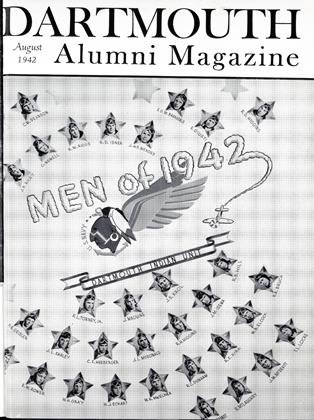[The following summary is pertinent to thefeature article in this issue of the ALUMNIMAGAZINE, see page 13.—ED:]
ON A RECENT "Town Hall of the Air" program Leon Henderson, OPA Administrator boiled down a lot of good advice into the following brief summary:
"First of all, you and I can help win this war by cutting down on our spending, and I mean cutting down all along the line. Instead of buying now, we must make up our minds to buy later. Now that sounds hard, and it is harsh, but we have a war on our hands—a war-that demands every ounce of energy and determination of which we are capable. It's the simple, plain, economic truth that we Americans can no longer afford to buy the things that we are accustomed to buying.
"Many of our shipyards, many of our plane factories, many of our tank arsenals could produce more today if they only had raw materials. Now, we can't buy tanks and planes and go on buying automobiles and refrigerators. And we can't buy planes and steel scrap to feed our furnaces, and indulge ourselves with new radios and cigar lighters and table gadgets.
RESTRAIN NEW DEMANDS
"WPB can handle some of these things by simply curtailing their manufacture. But we, ourselves, as individuals must discipline our demands for the supplies that are already on our shelves. With every day and every hour we reduce the supply of civilian goods. And as that area narrows, as the things we used to buy become fewer and fewer, the pressure of demand forces prices higher.
"Second, you and I can help by investing in war bonds and savings stamps. In that way, we put our money to work to help win the war. Now the English have a good custom. They sometimes buy bonds, and they are used directly to pay for a battleship or a bomber whose name the people who have saved can remember. With saving also, we siphon off extra purchasing power and provide ourselves with a cushion for the postwar period.
"Third, you and I can help, curiously enough, by paying off our debts; and dollars are cheap and plentiful now. They press heavily on prices and supplies and deteriorate both.
"Fourth, you and I can help by staying out of debt after we have paid off our debts. When money is easy, there is a temptation to go into debt—to buy on the installment plan. If purchases must be made, let's save the cash before making the purchase.
"Fifth, you and I can help, and I emphasize this, by refusing to hoard.
"Sixth, you and I can help win the war by saving what we have. We can and must make what we have do for another day or another week. And I am not exaggerating when I say that a man who wastes rubber by speeding, by using his car for pleasure jaunts, is making things harder for the men behind the guns. Every ounce of rubber on every tire of America is valuable. And every ton of steel we save can go into munitions. So keep in mind that New England ditty, "Use it up,wear it out, make it do, or do without."
"And finally, you can help OPA by obeying the price regulations."
 View Full Issue
View Full Issue













